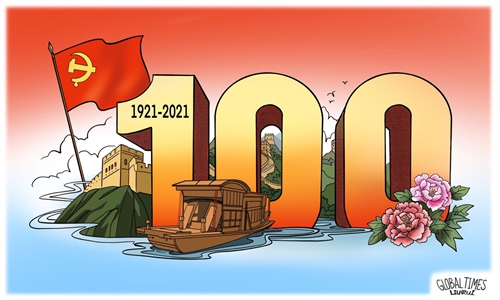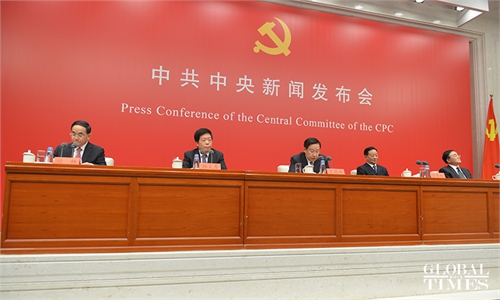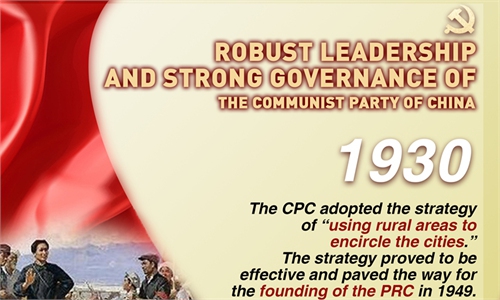Key plenum stresses CPC leadership with strong core key to leading nation toward rejuvenation
Western democracy dominated by capital, not true democracy

Xi Jinping, Li Keqiang, Li Zhanshu, Wang Yang, Wang Huning, Zhao Leji and Han Zheng attend the sixth plenary session of the 19th CPC Central Committee in Beijing, capital of China.Photo:Xinhua
The just-concluded sixth plenary session of the 19th Communist Party of China (CPC) Central Committee has highlighted the significance of the Party's leadership, which is key for the CPC to overcome challenges and to achieve historic goals, said senior CPC officials on Friday.
Chinese experts on Party history and politics said that a mature and successful political system is able to maximize its advantages, especially the advantage of the leadership with a strong core. China's political system showed that it is not only capable of realizing effective reform and self-correction, but also can maximize and reinforce its biggest advantage in the new era - a strong core of the leadership.
On Friday, the CPC Central Committee held a press conference in Beijing to introduce the significance and information about the Party's latest plenum and answer questions from media worldwide. The high-profile meeting, held in Beijing from November 8 to 11, has adopted a landmark resolution on the major achievements and historical experience of the CPC's 100 years of endeavors, according to a communique released on Thursday.
The plenum, which was convened at a critical historical juncture, is of great historical significance, said Wang Xiaohui, executive deputy director of the Publicity Department of the CPC Central Committee, at the press conference.
This has demonstrated a high degree of political awareness of the Party in valuing and making good use of the laws of history, Wang said, adding that it also revealed the Party's confidence and commitment in staying true to its original aspiration to further advance its cause.
Wang said the resolution adopted at the session reveals "why we were successful in the past and how we can continue to succeed in the future."
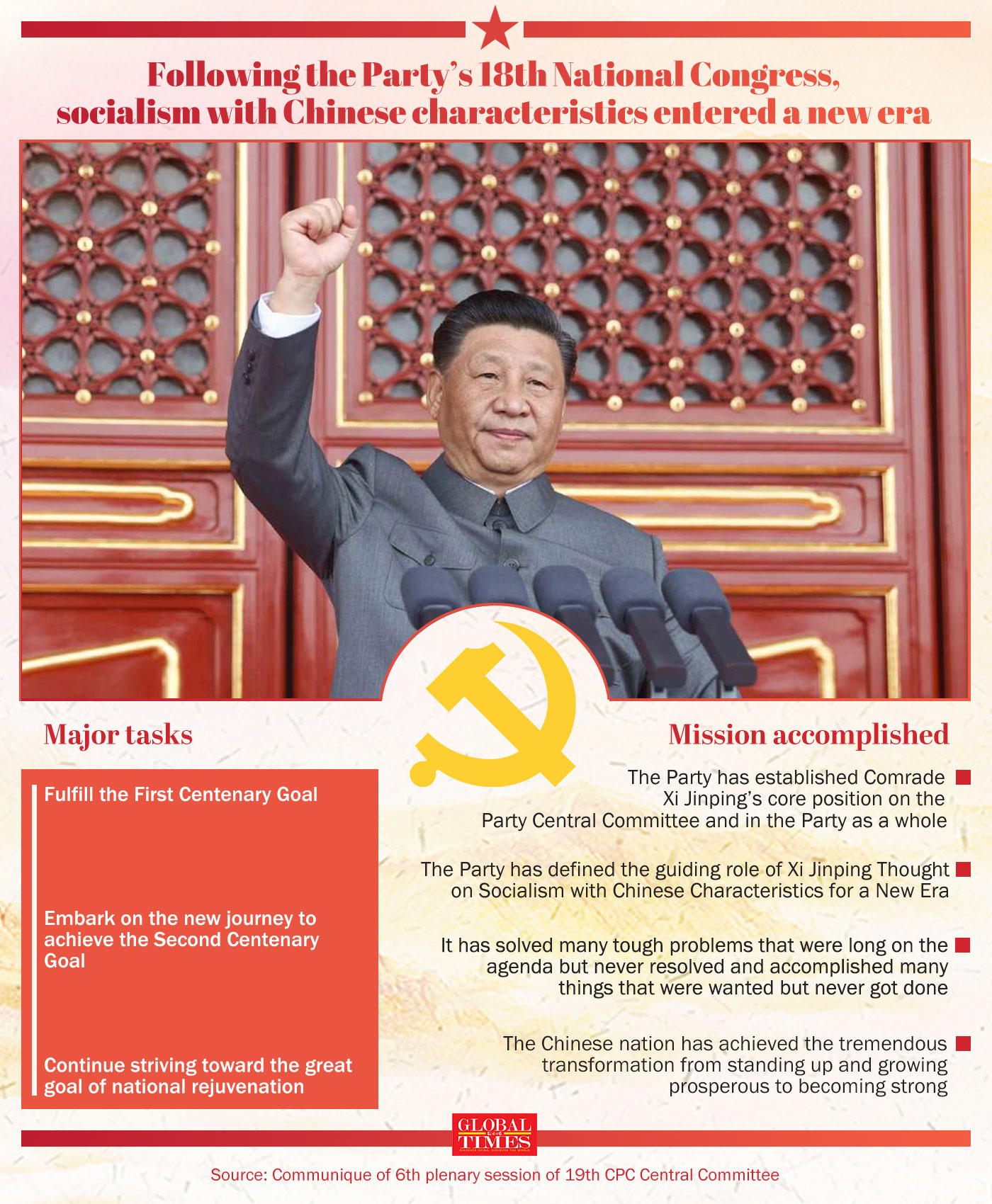
Graphic: GT
Leadership with strong core
On the question of "how we can continue to succeed in the future," the communique has given the answer, which is also a "common will" shared by the whole country.
The Party has established Comrade Xi Jinping's core position on the Party Central Committee and in the Party as a whole and defined the guiding role of Xi Jinping Thought on Socialism with Chinese Characteristics for a New Era, the communique said.
"This reflects the common will of the Party, the armed forces, and the Chinese people of all ethnic groups, and is of decisive significance for advancing the cause of the Party and the country in the new era and for driving forward the historic process of national rejuvenation," it stated.
"This is the call of the times, the choice of history, and the common aspiration of the people," said Jiang Jinquan, head of the Policy Research Office of the CPC Central Committee, on Friday at the press conference on the plenary session.
"In firmly upholding and safeguarding General Secretary Xi's core position, the Party has its decision-maker, the people have their mainstay, and the giant 'rejuvenation' ship of the Chinese nation has its helmsman," he said. "And in the face of rough waves, we will be able to 'stay on the fishing boat despite the wind and waves.'"
Zhang Weiwei, director of the China Institute of Fudan University in Shanghai, said that the Chinese political system has showed that it's capable of "maximizing the good" especially since the constitutional amendment in 2018.
"An ideal political system needs the policy to 'weed out the bad,' which means preventing unqualified personnel from abusing power and doing bad things that harm the Party and people's interests. But this is not enough. It also needs the policy to 'maximize the good', and this means it can not only elect outstanding leaders, but also enable them to maximize their talents and advantages, to make greater contributions and achieve grand goals as much as possible," Zhang said.
China's political system, with the CPC's leadership, has both the policy to weed out the unqualified and maximize the good, said analysts, stressing that this is why the latest plenum's communique stated that establishing Xi's core position on the Party Central Committee and in the Party as a whole is the common will of the Party, the armed forces, and the Chinese people of all ethnic groups.
The leadership core in the new era has already proved he is qualified to lead the country to march toward the national rejuvenation, said analysts, as according to the communique, in the new era, the CPC Central Committee, with Xi at its core, "has demonstrated great historical initiative, tremendous political courage, and a powerful sense of mission…has solved many tough problems that were long on the agenda but never resolved and accomplished many things that were wanted but never got done. With this, it has prompted historic achievements and historic shifts in the cause of the Party and the country."
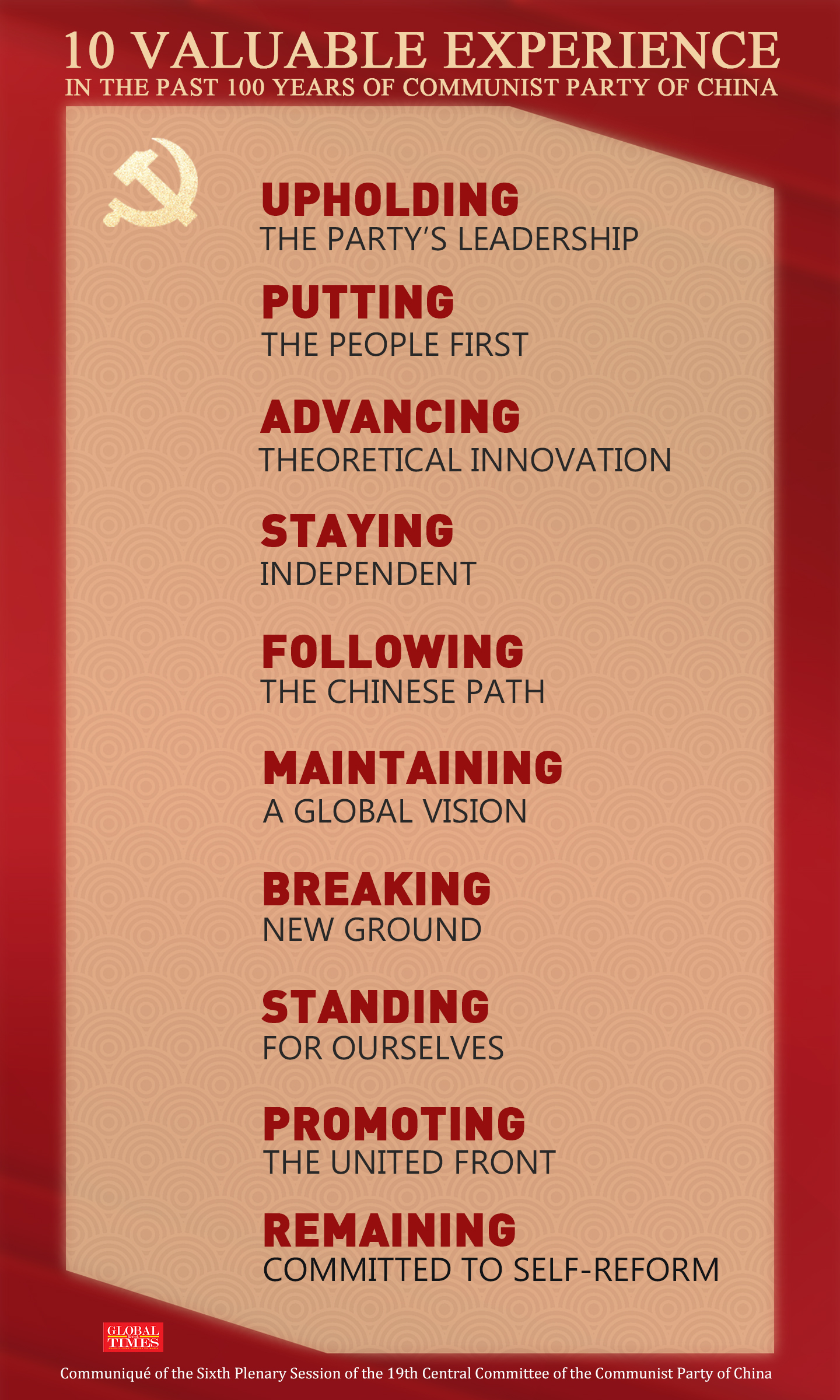
10 valuable experience accumulated in the past 100 years of Communist Party of China. Graphic: GT
Definition of democracy
"Unfortunately, Western countries, especially the US, have recently found their political system has failed to prevent the bad, and also is unable to elect the good," Zhang said.
But the US is still trying to manipulate the definition of democracy, and to make its problematic political system a "universal value" to launch an ideological offensive to attack other countries that choose different paths, said experts.
The US' democracy summit next month with the attempt to "revive" Western democracy amid mounting democratic problems in their countries is a huge irony, as its purpose is simply to suppress other countries and divide the world into different camps, Jiang said at the press conference.
He said democracy is not the patent of the West, nor can it be defined by the West. Western democracy is a democracy dominated by capital, a democracy of the rich, not true democracy.
Some Western countries have shown a hollowing out of democracy, triggering dissatisfaction among their people, but they are still trying to impose their democratic model on other countries. Color revolutions in recent years have resulted in disasters, which the people of the world have become increasingly aware of, Jiang said in response to a question on comparing China's whole-process people's democracy and Western democracy.
Yang Xuedong, a professor of political science at Tsinghua University, told the Global Times that it's easy to find which system, Western multi-party/two-party system or China's system of multiparty cooperation and political consultation under the leadership of the CPC, is more democratic, more suitable for the time - to compare their performances in dealing with the most serious and difficult challenges of our times.
The performance of the two systems in fighting the COVID-19 pandemic has told everything - the Western system has also showed that it has failed to correct the mistake even if its society has already found the problem, and could even repeat the mistake again and again, said experts.
Zheng Yongnian, a Chinese political scientist and political commentator, told the Global Times that the resolution passed at the latest plenum will serve as a cornerstone that leads China into the future and could enlighten other countries and regions of the world to seek a development path based on their own history.
"Many people are stuck in Utopia, and they hope there will be a system that can solve all their problems, but this is useless," Zheng said, adding that every country and region should start from their own history and find ways for the future, citing failures of countries in the Middle East as well as Myanmar in copying Western-styled democracy.
Jiang listed several polls as an example. According to a new survey from the Pew Research Center, 57 percent of global respondents and 72 percent of Americans said that US democracy used to be a good example for others to follow but has not been recently. According to an NPR poll, 81 percent of US adults said the future of US democracy is under threat.
In contrast, two recent polls released by a US polling agency showed that Chinese people's satisfaction with the CPC and the Chinese government is 95 percent and 98 percent, respectively.
Democracy is not for decoration, but for solving people's problems. Whether a country is democratic or not depends on whether its people are the masters of the country, whether its people have the right to vote, and more importantly, whether they have the right to participate widely. It depends on what promises are made during the election process, but also depends on how many of these promises are fulfilled after an election, Jiang said.
"Democracy is not true if the people are awakened only at the time of voting and then fall into hibernation, if they can only listen to the election slogans but have no say after the election, if they are favored only at the time of campaigning and then are left out after the election," Jiang said.
The communiqué emphasized the importance of upholding the CPC's overall leadership, the Central Committee's authority, and its centralized, unified leadership. Some Western media have made an issue of China's efforts in strengthening "centralized, unified leadership,"accusing China of becoming more "authoritarian."
Zheng, who's acting dean of the School of Humanities and Social Science and the founding director of the Advanced Institute of Global and Contemporary China Studies, the Chinese University of Hong Kong, Shenzhen, dismissed such accusations, saying they are wrong and lack basic understanding of China's political system.
He said as a country with a large population, multiple ethnic groups and big regional gaps, China needs centralized leadership, but China's political centralization doesn't impact the country's social diversity. China has social, economic, cultural and religious diversity.
Western accusation of "China's political system being centralized" is wrong, as centralization is not a concept of China's tradition. It's Western concept, Zheng said, adding that "all modern states are centralized, and in some aspects, the Western political systems are much more centralized. Whether in the Soviet Union's system or Western system, they are all highly centralized."
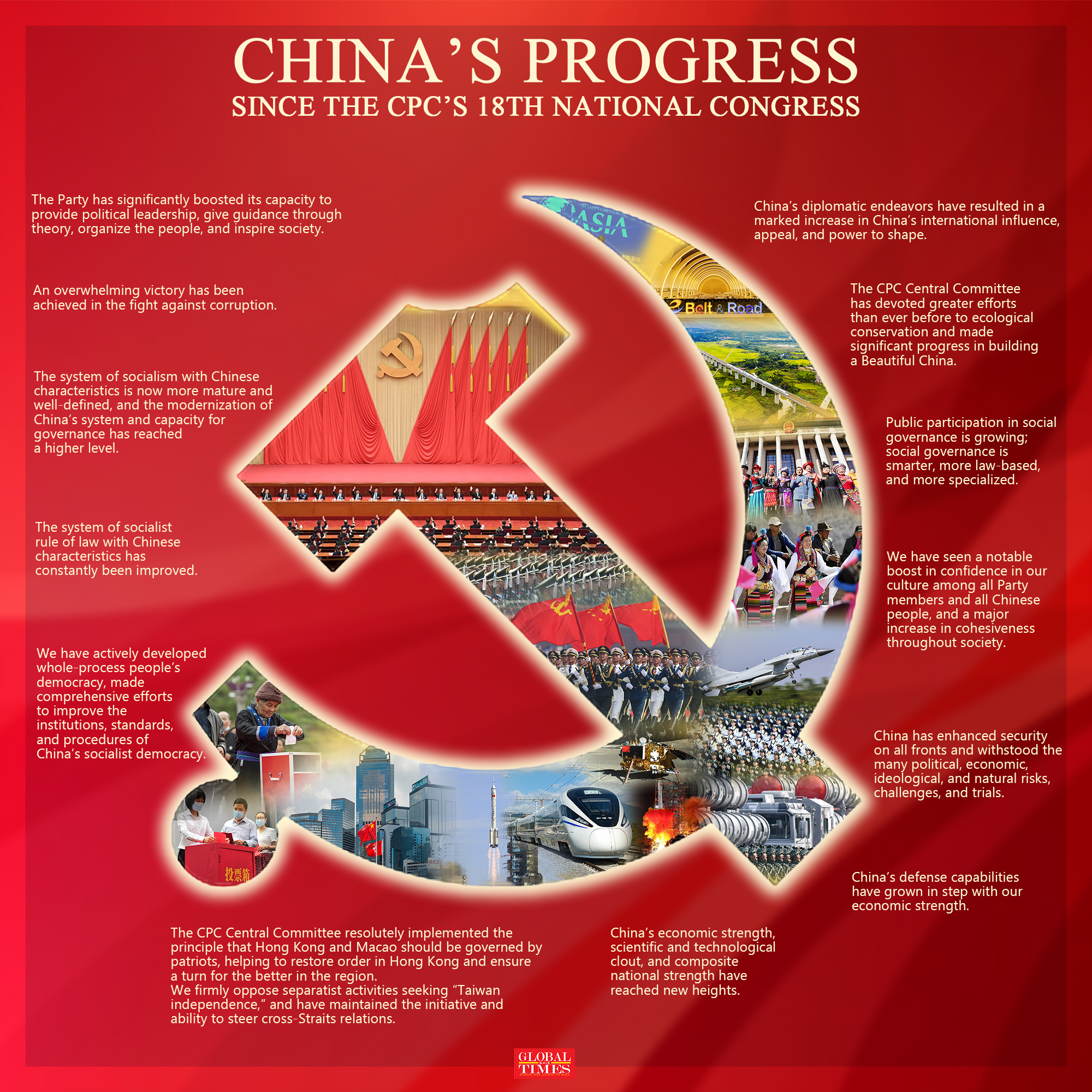
China's progress since the CPC's 18th National Congress. Graphic: GT
Road to the future
The CPC now has found a correct path and has summarized its achievements in the past century and key experiences of "why we were successful in the past," analysts said, so now it's time for it to bring the whole nation to its next historic goal - the great national rejuvenation of the Chinese nation.
"Every Party member should bear in mind what the Party is and what its mission is — these are issues of fundamental importance that we must never lose sight of," the communique said.
This is a remarkable sentence in the communique, because the question about "what the Party is and what its mission is" has been answered in the Party constitution and a series of key documents, but the CPC still needs to answer it with the development of the time in the language that could let every Party member understand who they are and what are their tasks in their era, Wu Xinwen, a professor and expert on Marxism at Fudan University in Shanghai, told the Global Times.
"Since its founding in 1921, the Party has made seeking happiness for the Chinese people and rejuvenation for the Chinese nation its mission," the communique said.
In the new era, the CPC is marching toward the goal of national rejuvenation with highest confidence and approval among the people, but this historic goal will consist of different sub-tasks which will be accomplished one by one and step by step, including resolving the Taiwan question and realizing national reunification, to achieving "common prosperity," Yang said.
In this process, the CPC will also extend its global vision, to seek more contributions and participation to deal with the shared challenges with other countries, such as fighting the pandemic, handling climate change, realizing global economic recovery and building a community of shared future for mankind, said experts, stressing that when China realizes its national rejuvenation, its contributions to the world will also reach new heights.


